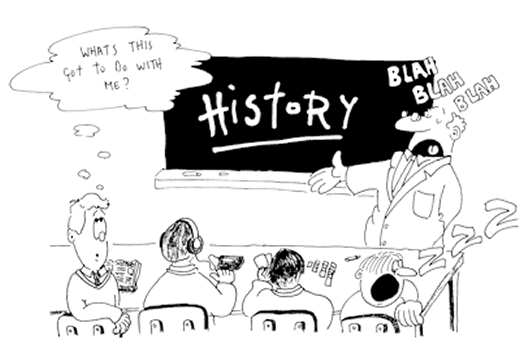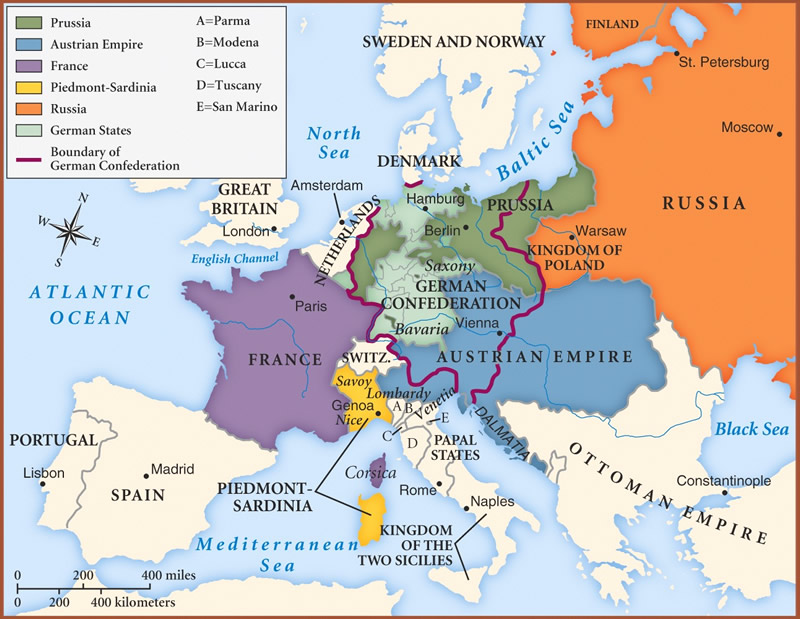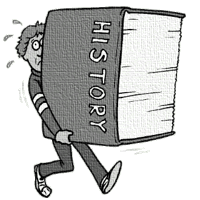Why do we study History?
quotations and quotes

The following quotations and quotes might help to persuade that both studying and knowing about History - are truly important!
"The biggest challenge facing the great teachers and communicators of history is not to teach history itself, nor even the lessons of history, but why history matters. How to ignite the first spark of the will o'the wisp, the Jack o'lantern, the ignis fatuus [foolish fire] beloved of poets, which lights up one source of history and then another, zigzagging across the marsh, connecting and linking and writing bright words across the dark face of the present. There's no phrase I can come up that will encapsulate in a winning sound-bite why history matters. We know that history matters, we know that it is thrilling, absorbing, fascinating, delightful and infuriating, that it is life."
Stephen Fry, Making History

"In history, a great volume is unrolled for our instruction, drawing the materials of future wisdom from the past errors and infirmities of mankind."
Edmund Burke

"What man is, only history tells."
George Mosse

"The first glance at History convinces us that the actions of men proceed from their needs, their passions, their characters and talents; and impresses us with the belief that such needs, passions and interests are the sole spring of actions."
Georg Hegel, 1770-1831, German philosopher, The Philosophy of History (1837)

"Mankind are so much the same, in all times and places, that history informs us of nothing new or strange in this particular. Its chief use is only to discover the constant and universal principles of human nature."
David Hume

"History is for human self-knowledge ... the only clue to what man can do is what man has done. The value of history, then, is that it teaches us what man has done and thus what man is."
R. G. Collingwood

"The value of history is, indeed, not scientific but moral: by liberalizing the mind, by deepening the sympathies, by fortifying the will, it enables us to control, not society, but ourselves -- a much more important thing; it prepares us to live more humanely in the present and to meet rather than to foretell the future."
Carl Becker, 1873-1945, U.S. historian

"Human nature will not change. In any future great national trial, compared with the men of this, we shall have as weak and as strong, as silly and as wise, as bad and as good. Let us therefore study the incidents in this as philosophy to learn wisdom from and none of them as wrongs to be avenged."
Abraham Lincoln (in the context of The American Civil War of 1861 to 1865)

"We study history not to be clever in another time, but to be wise always."
Marcus Tullius Cicero

"Why on earth does it matter what happened long ago? The answer is that History is inescapable. It studies the past and the legacies of the past in the present. Far from being a 'dead' subject, it connects things through time and encourages its students to take a long view of such connections.
All people and peoples are living histories. To take a few obvious examples: communities speak languages that are inherited from the past. They live in societies with complex cultures, traditions and religions that have not been created on the spur of the moment. People use technologies that they have not themselves invented. … So understanding the linkages between past and present is absolutely basic for a good understanding of the condition of being human. That, in a nutshell, is why History matters. It is not just 'useful', it is essential."
Penelope J. Corfield, Professor Emeritus, University of London.

As to answering the questions "Why does History Matter?" and "Why do we study History?" - it is hoped that the quotations and quotes just presented on this page have helped to persuade that both studying History, and knowing about History, are truly important!

Does Human Nature underpin much of Human History?
"…can we possibly refuse to admit that there exist in each
of us the same generic parts and characteristics as are found in
the state? For I presume the state has not received them from any
other source. It would be ridiculous to imagine that the presence
of the spirited element in cities is not to be traced to
individuals, wherever this character is imputed to the people, as
it is to the natives of Thrace, and Scythia, and generally
speaking, of the northern countries; or the love of knowledge,
which would be chiefly attributed to our own country; or the love
of riches, which people would especially connect with the
Phoenicians and the Egyptians."
Socrates / Plato ~ who lived long, long ago ~ in Ancient Greece
Socrates / Plato ~ who lived long, long ago ~ in Ancient Greece
Is it credible that Societies could well be often founded on Human Nature???
"Whatever concept one may hold, from a metaphysical point of view, concerning the freedom of the will, certainly its appearances,
which are human actions, like every other natural event, are determined by universal laws. However obscure their causes, history,
which is concerned with narrating these appearances, permits us to hope that if we attend to the play of freedom of the human will
in the large, we may be able to discern a regular movement in it, and that what seems complex and chaotic in the single individual
may be seen from the standpoint of the human race as a whole to be a steady and progressive though slow evolution of its original endowment."
Immanuel Kant
Idea for a Universal History from a Cosmopolitan Point of View
Immanuel Kant
Idea for a Universal History from a Cosmopolitan Point of View
"What is the business of history? What is the
stuff of which it is made? Who is the personage
of history? Man : evidently man and human
nature. There are many different elements in history. What are they?
Evidently again, the elements of human nature. History is therefore the
development of humanity, and of humanity only;
for nothing else but humanity develops itself, for
nothing else than humanity is free. ...
... Moreover, when we have all the elements, I mean all the essential elements, their mutual relations do, as it were, discover themselves. We draw from the nature of these different elements, if not all their possible relations, at least their general and fundamental relations."
Victor Cousin
Introduction to the History of Philosophy
Or to quote Ralph Waldo Emerson, from his famous Essay ~ History :-
"In old Rome the public roads beginning at the Forum proceeded north, south, east, west, to the centre of every province of the empire, making each market-town of Persia, Spain, and Britain pervious to the soldiers of the capital: so out of the human heart go, as it were, highways to the heart of every object in nature, to reduce it under the dominion of man. A man is a bundle of relations, a knot of roots, whose flower and fruitage is the world. His faculties refer to natures out of him, and predict the world he is to inhabit, as the fins of the fish foreshow that water exists, or the wings of an eagle in the egg presuppose air. He cannot live without a world."
... Moreover, when we have all the elements, I mean all the essential elements, their mutual relations do, as it were, discover themselves. We draw from the nature of these different elements, if not all their possible relations, at least their general and fundamental relations."
Victor Cousin
Introduction to the History of Philosophy
Ralph Waldo Emerson
Or to quote Ralph Waldo Emerson, from his famous Essay ~ History :-
"In old Rome the public roads beginning at the Forum proceeded north, south, east, west, to the centre of every province of the empire, making each market-town of Persia, Spain, and Britain pervious to the soldiers of the capital: so out of the human heart go, as it were, highways to the heart of every object in nature, to reduce it under the dominion of man. A man is a bundle of relations, a knot of roots, whose flower and fruitage is the world. His faculties refer to natures out of him, and predict the world he is to inhabit, as the fins of the fish foreshow that water exists, or the wings of an eagle in the egg presuppose air. He cannot live without a world."
and again:-
"There is one mind common to all individual men....
....Of the works of this mind history is the record. Man is explicable by nothing less than all his history. All the facts of history pre-exist as laws. Each law in turn is made by circumstances predominant. The creation of a thousand forests is in one acorn, and Egypt, Greece, Rome, Gaul, Britain, America, lie folded already in the first man. Epoch after epoch, camp, kingdom, empire, republic, democracy, are merely the application of this manifold spirit to the manifold world."
....Of the works of this mind history is the record. Man is explicable by nothing less than all his history. All the facts of history pre-exist as laws. Each law in turn is made by circumstances predominant. The creation of a thousand forests is in one acorn, and Egypt, Greece, Rome, Gaul, Britain, America, lie folded already in the first man. Epoch after epoch, camp, kingdom, empire, republic, democracy, are merely the application of this manifold spirit to the manifold world."

Emerson, alike with very many of the thinking persons living in the USA in the eighteen-thirties who had the inclination and leisure time to interest themselves in ideas, was greatly influenced by the works of Victor Cousin!
Even before he had first read Cousin, (in 1829), he had expressed views in his private Journals which suggest that he accepted that Human Nature, and Human Beings, tend to display three identifiable aspects and orientations.
Imagine hope to be removed from the human breast & see how Society will sink, how the strong bands of order & improvement will be relaxed & what a deathlike stillness would take the place of the restless energies that now move the world. The scholar will extinguish his midnight lamp, the merchant will furl his white sails & bid them seek the deep no more. The anxious patriot who stood out for his country to the last & devised in the last beleagured citadel, profound schemes for its deliverance and aggrandizement, will sheathe his sword and blot his fame. Remove hope, & the world becomes a blank and rottenness.
(Journal entry made between October and December, 1823)
In all districts of all lands, in all the classes of communities thousands of minds are intently occupied, the merchant in his compting house, the mechanist over his plans, the statesman at his map, his treaty, & his tariff, the scholar in the skilful history & eloquence of antiquity, each stung to the quick with the desire of exalting himself to a hasty & yet unfound height above the level of his peers. Each is absorbed in the prospect of good accruing to himself but each is no less contributing to the utmost of his ability to fix & adorn human civilization.
(Journal entry of December, 1824)
Our neighbours are occupied with employments of infinite diversity. Some are intent on commercial speculations; some engage warmly in political contention; some are found all day long at their books …
(This dates from January - February, 1828)
(Journal entry made between October and December, 1823)
In all districts of all lands, in all the classes of communities thousands of minds are intently occupied, the merchant in his compting house, the mechanist over his plans, the statesman at his map, his treaty, & his tariff, the scholar in the skilful history & eloquence of antiquity, each stung to the quick with the desire of exalting himself to a hasty & yet unfound height above the level of his peers. Each is absorbed in the prospect of good accruing to himself but each is no less contributing to the utmost of his ability to fix & adorn human civilization.
(Journal entry of December, 1824)
Our neighbours are occupied with employments of infinite diversity. Some are intent on commercial speculations; some engage warmly in political contention; some are found all day long at their books …
(This dates from January - February, 1828)

Plato, Socrates and Shakespeare endorse a Tripartite Soul view of Human Nature
Several authoritative key insights,
(from the Great Faiths, Plato, Socrates, Pythagoras, Shakespeare and Ralph Waldo Emerson!!!),
are available on our pages that give convincing support to such a "Tripartite" view of Human Nature!!!

In about 1837 Ralph Waldo Emerson considered that he had moved on somewhat from being very strongly influenced by Victor Cousin. He had by this time established himself as a public lecturer - for which he received considerable payment.
He prepared some essays for publication in 1841 and in one of them, entitled "History" ~ which Emerson placed first in this volume of essays ~ wrote that:-
"...man is a bundle of relations, a knot of roots,
whose flower and fruitage is the world..."
~ Should this be true it would follow that Human Societies often tend to arise out of the Human Condition as directly influenced by Human Nature!
1848 : the ruling Dynasties of Europe
challenged by Socio-political aspirations
We have prepared some fairly detailed, but hopefully "truth-full, informative, and ~ given the extent of the subject ~ brief", pages about a most deeply revealing episode in European History in the spirit of attempting to learn worthwhile lessons of history!!!
The events of 1848 display the existence and latent power of many societal pressures which have subsequently fully contributed to the "Emergence of Modernity" in the Western world.
Prior to 1848 the existence of these societal pressures was often unsuspected or ignored, - their latent power was certainly vastly unappreciated.
The events of 1848 display the existence and latent power of many societal pressures which have subsequently fully contributed to the "Emergence of Modernity" in the Western world.
Prior to 1848 the existence of these societal pressures was often unsuspected or ignored, - their latent power was certainly vastly unappreciated.
In February 1948, the British historian Lewis
Namier delivered a lecture commemorating the centennial of the
European Revolutions of 1848.
In this lecture Namier presented facts about the historical developments, themes, and events evident in 1848 and reached the conclusion that:-
Learning lessons of history can surely be seen as a pressing necessity in the hope of yielding up some guidlines for the adoption of practical policies intended to enhance the possibility for the lessening of injustices and for the avoidance of conflict.
We would hope that our coverage of this "dramatic historical watershed" will provide something of a persuasive outline as to how it came about that the Dynastic Europe of 1815 came to undergo those sweeping changes which have tended to produce the populist Europe of Modern Times!

The European political map above, agreed at the Congress of Vienna of 1815, saw some changes, (principally due to the emergence of Belgium and Greece), before the widespread Revolutions of 1848-1849.

In this lecture Namier presented facts about the historical developments, themes, and events evident in 1848 and reached the conclusion that:-
"1848
remains a seed-plot of history. It crystallized ideas and projected the pattern of
things to come; it determined the course of the following century."
If Namier is right in viewing the "Revolutions of 1848" as featuring a seed-plot of history, and if we can identify the early attempts at growth
and development by such evident resulting "seedlings" as Liberalism, Constitutionalism, Democracy, Socialism and Nationalism ~ including such competition
as came to exist between them for "a Place in the Sun" (in situations where, although shaken, down-but-not-out dynastic authority was usually trying to
suppress them, fairly successfully in 1848 and with diminishing effectiveness over ensuing decades) then surely we will
have succeeded to some degree in actually learning lessons of history.Learning lessons of history can surely be seen as a pressing necessity in the hope of yielding up some guidlines for the adoption of practical policies intended to enhance the possibility for the lessening of injustices and for the avoidance of conflict.
We would hope that our coverage of this "dramatic historical watershed" will provide something of a persuasive outline as to how it came about that the Dynastic Europe of 1815 came to undergo those sweeping changes which have tended to produce the populist Europe of Modern Times!

The European political map above, agreed at the Congress of Vienna of 1815, saw some changes, (principally due to the emergence of Belgium and Greece), before the widespread Revolutions of 1848-1849.

Our coverage of The European Revolutions of 1848 is relatively brief,
fast-paced, and considered by ourselves at least, to be highly revealing!!!
fast-paced, and considered by ourselves at least, to be highly revealing!!!
